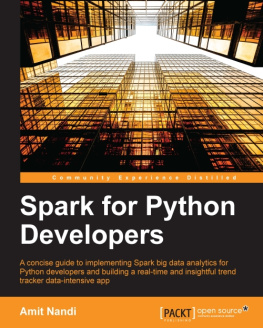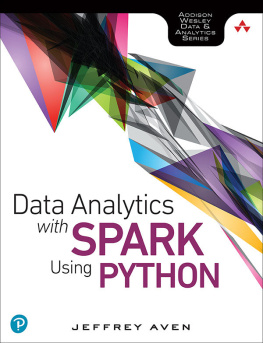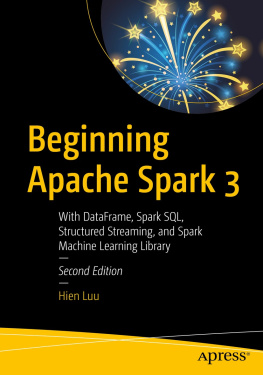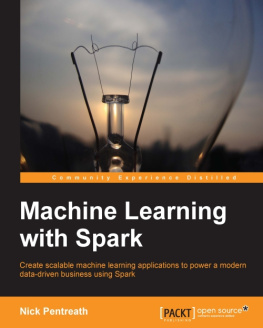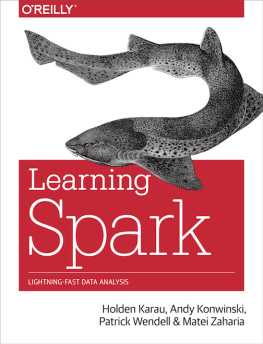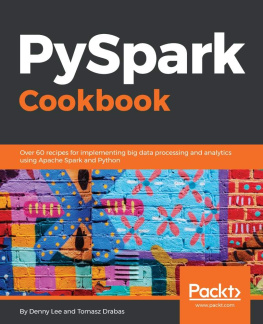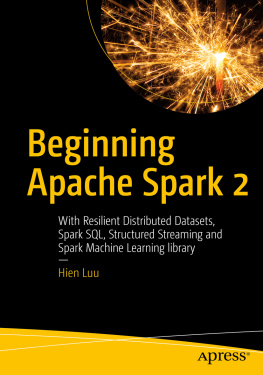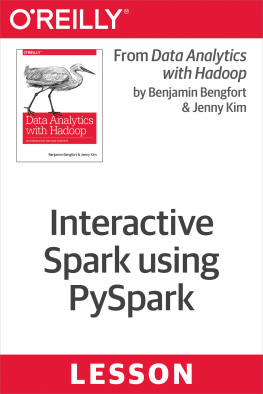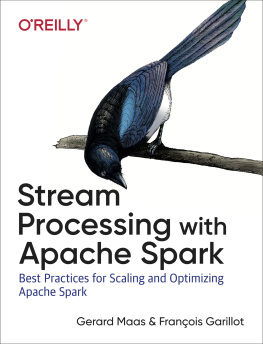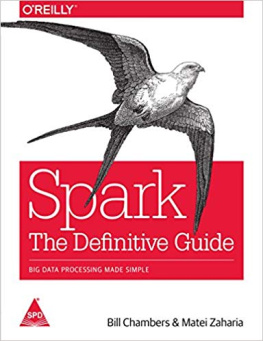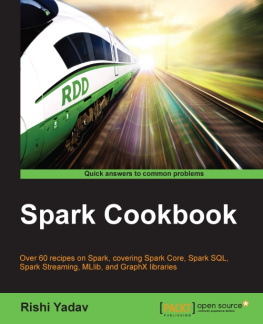Amit Nandi - Spark for Python Developers
Here you can read online Amit Nandi - Spark for Python Developers full text of the book (entire story) in english for free. Download pdf and epub, get meaning, cover and reviews about this ebook. year: 2015, publisher: Packt Publishing, genre: Computer. Description of the work, (preface) as well as reviews are available. Best literature library LitArk.com created for fans of good reading and offers a wide selection of genres:
Romance novel
Science fiction
Adventure
Detective
Science
History
Home and family
Prose
Art
Politics
Computer
Non-fiction
Religion
Business
Children
Humor
Choose a favorite category and find really read worthwhile books. Enjoy immersion in the world of imagination, feel the emotions of the characters or learn something new for yourself, make an fascinating discovery.
- Book:Spark for Python Developers
- Author:
- Publisher:Packt Publishing
- Genre:
- Year:2015
- Rating:3 / 5
- Favourites:Add to favourites
- Your mark:
Spark for Python Developers: summary, description and annotation
We offer to read an annotation, description, summary or preface (depends on what the author of the book "Spark for Python Developers" wrote himself). If you haven't found the necessary information about the book — write in the comments, we will try to find it.
- Set up real-time streaming and batch data intensive infrastructure using Spark and Python
- Deliver insightful visualizations in a web app using Spark (PySpark)
- Inject live data using Spark Streaming with real-time events
Looking for a cluster computing system that provides high-level APIs? Apache Spark is your answeran open source, fast, and general purpose cluster computing system. Sparks multi-stage memory primitives provide performance up to 100 times faster than Hadoop, and it is also well-suited for machine learning algorithms.
Are you a Python developer inclined to work with Spark engine? If so, this book will be your companion as you create data-intensive app using Spark as a processing engine, Python visualization libraries, and web frameworks such as Flask.
To begin with, you will learn the most effective way to install the Python development environment powered by Spark, Blaze, and Bookeh. You will then find out how to connect with data stores such as MySQL, MongoDB, Cassandra, and Hadoop.
Youll expand your skills throughout, getting familiarized with the various data sources (Github, Twitter, Meetup, and Blogs), their data structures, and solutions to effectively tackle complexities. Youll explore datasets using iPython Notebook and will discover how to optimize the data models and pipeline. Finally, youll get to know how to create training datasets and train the machine learning models.
By the end of the book, you will have created a real-time and insightful trend tracker data-intensive app with Spark.
What you will learn- Create a Python development environment powered by Spark (PySpark), Blaze, and Bookeh
- Build a real-time trend tracker data intensive app
- Visualize the trends and insights gained from data using Bookeh
- Generate insights from data using machine learning through Spark MLLIB
- Juggle with data using Blaze
- Create training data sets and train the Machine Learning models
- Test the machine learning models on test datasets
- Deploy the machine learning algorithms and models and scale it for real-time events
Amit Nandi studied physics at the Free University of Brussels in Belgium, where he did his research on computer generated holograms. Computer generated holograms are the key components of an optical computer, which is powered by photons running at the speed of light. He then worked with the university Cray supercomputer, sending batch jobs of programs written in Fortran. This gave him a taste for computing, which kept growing. He has worked extensively on large business reengineering initiatives, using SAP as the main enabler. He focused for the last 15 years on start-ups in the data space, pioneering new areas of the information technology landscape. He is currently focusing on large-scale data-intensive applications as an enterprise architect, data engineer, and software developer. He understands and speaks seven human languages. Although Python is his computer language of choice, he aims to be able to write fluently in seven computer languages too.
Table of Contents- Setting Up a Spark Virtual Environment
- Building Batch and Streaming Apps with Spark
- Juggling Data with Spark
- Learning from Data Using Spark
- Streaming Live Data with Spark
- Visualizing Insights and Trends
Amit Nandi: author's other books
Who wrote Spark for Python Developers? Find out the surname, the name of the author of the book and a list of all author's works by series.

